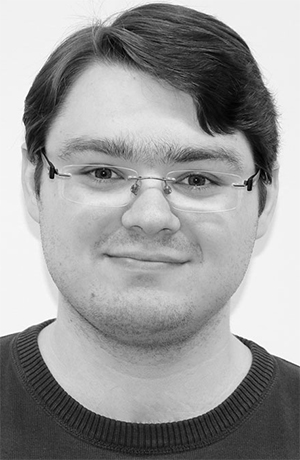Simon Fries, M.A.

Faculty of Classics
University of Oxford
https://www.classics.ox.ac.uk/people/simon-fries-0
E-Mail: simon.fries[at]classics.ox.ac.uk
Publikationen
- Fries, Simon and Natalie Korobzow. 2024. On the dating of sound changes and its implications for language relationship. The case of Proto-Yeniseian *p- > Ket h-, Yugh f-. Diachronica. DOI: https://doi.org/10.1075/dia.23030.fri (online first).
- Hill, Eugen, Simon Fries, Natalie Korobzow, Laura Günther & Svenja Bonmann. 2024. Towards a New Reconstruction of the Proto‑Yeniseian Sound System. Part II: Word‑Final Consonants. International Journal of Eurasian Linguistics 6(2), 216–293. https://doi.org/10.1163/25898833-20240062
- Halfmann, Jakob, Svenja Bonmann, Simon Fries and Natalie Korobzow 2023. A New Reading of the Bactrian Part of the Dašt-i Nāwur Trilingual (DN I). Indo-Iranian Journal 67(1). 5–51. DOI: 10.1163/15728536-06701005.
- Fries, Simon, Jakob Halfmann, Eugen Hill & Denise Hübner. 2023. From noun to future tense. The functional diachrony of the l-future in the Nuristani languages and its typological background. Sprachtypologie und Universalienforschung (STUF) 76(1), 53-85. DOI: https://doi.org/10.1515/stuf-2023-2002
- Fries, Simon & Svenja Bonmann. 2023. The Development of Arin kul ‘water’ ~ Kott ûl, Ket ¹u·l’, Yugh ¹ur and Its Typological Background. International Journal of Eurasian Linguistics 5(2), 183-198. DOI: https://doi.org/10.1163/25898833-20230044.
- Bonmann, Svenja, Simon Fries, Natalie Korobzow, Laura Günther & Eugen Hill. 2023. Towards a New Reconstruction of the Proto-Yeniseian Sound System. Part I: Word-Initial Consonants, International Journal of Eurasian Linguistics 5, 39–82.
- Fries, Simon. 2023. On the origin of Greek first person singular optatives in -οιμι, their relation to Church Slavonic optatives in -ěmь, and the original function of primary and secondary endings in Proto-Indo-European. Die Sprache 55, 95-152.
- Fries, Simon. 2023[2021]. Why and How Do New Tense Formations Arise? – On the Emergence of the Vedic So-Called Periphrastic tā́-Future. Historische Sprachforschung 134, 96-165. DOI: https://doi.org/10.13109/hisp.2021.134.1.96
- Simon Fries. 2022. Über die Variation bū́tų ~ bū́t und mū́sų, jū́sų ~ mū́s, jū́s bei Christian Donelaitis. Archivum Lithuanicum 24, 27-56. DOI: https://doi.org/10.33918/26692449-24002
- Simon Fries. 2022. Über die Variation bū́tų ~ bū́t und mū́sų, jū́sų ~ mū́s, jū́s im Litauischen und ihren Hintergrund in den prosodischen Verhältnissen des Urostbaltischen. Baltu filoloģija 31(2), 4-47. DOI: https://doi.org/10.22364/bf.31.2.01
- Fries, Simon & Eugen Hill. 2022. Insights Into the Diachrony Of the East Baltic Subjunctive Mood. Baltistica 57(1), 5-44. DOI: https://doi.org/10.15388/Baltistica.57.1.2466
- Fries, Simon. 2022. Über die Herkunft der langvokalischen Konjunktive des Typs hom. ἐθέλωμι, ἐθέλῃσθα, ἐθέλῃσι. Glotta 98, 148-173. DOI: https://doi.org/10.13109/glot.2022.98.1.148
- Fries, Simon. 2021. A law of vowel lengthening before two word‑final dentals in Early Proto‑Indo‑European. Its morphological consequences, and its implications for the relation between Anatolian and the rest of Indo‑European. International Journal of Diachronic Linguistics and Linguistic Reconstruction 18, 1-142. DOI: https://doi.org/10.29091/9783752001013
- Hill, Eugen & Simon Fries. 2020. On Personal Endings of Thematic Verbs in Proto-Indo-European. In: Repanšek, Luca et al. (eds.), Vácām̐ si miśrā́ kr̥ṇavāmahai. Proceedings of the international conference of the Society for Indo-European Studies and IWoBA XII, Ljubljana 4–7 June 2019, celebrating one hundred years of Indo-European comparative linguistics at the University of Ljubljana. Hamburg: Baar, 255–284.
- Fries, Simon. 2020b. Untersuchungen über die lautgesetzliche Entstehung der Negationen lat. nē, nōn, nī und ihrer indogermanischen Entsprechungen. International Journal of Diachronic Linguistics and Linguistic Reconstruction 17, 65-154.
- Fries, Simon. 2020a. Alc. Frg. 208,9 V. Versuch einer Verteidigung des überlieferten ἄγκυρ(ρ)αι gegenüber konjiziertem ἄγκονναι. Rheinisches Museum für Philologie (N. F.) 163, 129–150.
- Fries, Simon. 2019. Kleines Lautgesetz, große Wirkung. Die Formen nisi, nimis, nihil, mihi, tibi, sibi, iīs und ihre Gemeinsamkeiten. Indogermanische Forschungen 124, 61–114. DOI: https://doi.org/10.1515/if-2019-0003
- Fries, Simon. 2018–2019[2021]. Sandhi and Syntax – Is there Prosodic Marking of Morpho-Syntactic Relations in Old Indo-Aryan?, Die Sprache 53(2), 153–226.
Organisation wissenschaftlicher Tagungen
- 2021 (gemeinsam mit Christian Mair, Daniel Jacob, Claudia Kohler, Miriam Neuhausen, Samira Ochs, Achim Rabus und Uta Reinöhl). Organisation der 43. Jahrestagung der Deutschen Gesellschaft für Sprachwissenschaft (DGfS) unter dem Motto Modell und Evidenz, 23.–26. Februar 2021, Albert-Ludwigs-Universität Freiburg.
Vorträge
- 2023 (gemeinsam mit Uta Reinöhl, Kirsten Culhane, Naomi Peck und Maria Vollmer). “One new idea” constraint holds cross-linguistically even in “flat” expressions. Vortrag gehalten auf der 16th International Cognitive Linguistics Conference, 7.-11. August 2023, Heinrich-Heine Universität Düsseldorf.
- 2023. One the Diachrony of the Latvian Debitive. Vortrag gehalten auf der Tagung “Endzelīns. Language. Time” anlässlich des 150. Geburtstages von Jan Enzdelin (1873-1961), 22.-23. Februar 2023, Universität Lettlands, Riga.
- 2022. Was there a loss of word-final nasals in Proto-East-Baltic? Vortrag gehalten auf der Tagung “Baltic Linguistics: Comparative Perspectives”, 22.-24. September 2022, Universität Vilnius.
- 2021 (gemeinsam mit Eugen Hill). Insights into the Diachrony of the East Baltic Subjunctive Mood. Vortrag gehalten auf dem XIII International Congress of Balticists, 13.–15. Oktober 2021, Universität Lettlands, Riga.
- 2019. Über die Interaktion zwischen Prosodie und Syntax im Altindoarischen [On the Interaction between Prosody and Syntax in Old Indo-Aryan]. Vortrag gehalten im Kolloquium der Area B (Morphosyntax and Semantics) des SFB 1252 zur Prominenz in Sprache an der Universität zu Köln.